9X with kidney failure uses crutches to make TikTok, 8 years of arguing about fate from a 4m2 rented room ( Video : Phuong Mai - Thanh Binh).
At 6am, from his small rented room, Pham Quang Huy (28 years old) walked to the hospital on crutches, carrying a lunch box he had prepared the night before. This solo trip has been all too familiar over the past 8 years.
A simple meal of boiled vegetables, braised meat and a little soup is what helps Huy regain his strength after a long dialysis session. Every week, he regularly goes to the hospital 3 times. The dialysis session, which lasts about 4 hours, is what helps the young man cling to life.
From the place that had become his home at Lane 121 Le Thanh Nghi (still called the dialysis area) to Bach Mai Hospital, it was about 500m long. Huy moved step by step. On sunny days like now, he had to take a few breaks.
At the hospital, Huy lay motionless while the dialysis machine worked instead of his kidney, which was in stage 5 of kidney failure. The blood vessels on his right arm were swollen like a rope running under his skin, a sign of more than 1,000 dialysis sessions.
In the afternoon, waiting for his body to recover, Huy used crutches to walk along the alley where he lived, holding his phone to record footage of the daily lives of hundreds of other kidney failure patients.

Some people were washing dishes after dinner, some were sitting in front of their house enjoying the cool breeze, some were putting scrap metal into their bags… They were all familiar with him and also used to filming.
Those short films were re-edited by Huy and posted on his personal TikTok channel.
At night, the young man with kidney failure is about to order orders that people support through social networking platforms. Each of these orders is his main source of income, helping him have more expenses for living expenses, medicine boxes, IV bottles...
In the middle of our meeting with this determined young man, it suddenly started to rain heavily. Huy looked out the balcony to the sound of the rain tapping on the tin roof.
That familiar sound brought the conversation back to another rainy night, in the shabby 4 square meter boarding house where Huy lived during his first time receiving treatment in Hanoi .

In 2015, while his peers were busy choosing dormitories or finding roommates for their new chapter in university life, Huy quietly chose for himself a room of only 4 square meters, with a ceiling height of less than 2 meters. Where the young man who had just graduated from high school began his journey of "running away" from illness in the crowded city.
Nearly a decade later, Huy still remembers those early, struggling days. The mattress was placed against the damp wall, barely wide enough for a person to crawl through. Every time he turned or reached for something, he had to avoid bumping into the rice cooker on the floor or the clothes hanging above the bed.
On rainy days, water from the roof leaked onto the floor, seeping through the edges of the mat. Huy could barely sleep, and had to stack his room’s furniture on top of each other to avoid getting wet.
“During long nights of heavy rain, the water reached up to my bed. I could only sit and watch the water rise. Sometimes I was so tired that I just lay down to sleep,” Huy recalls.
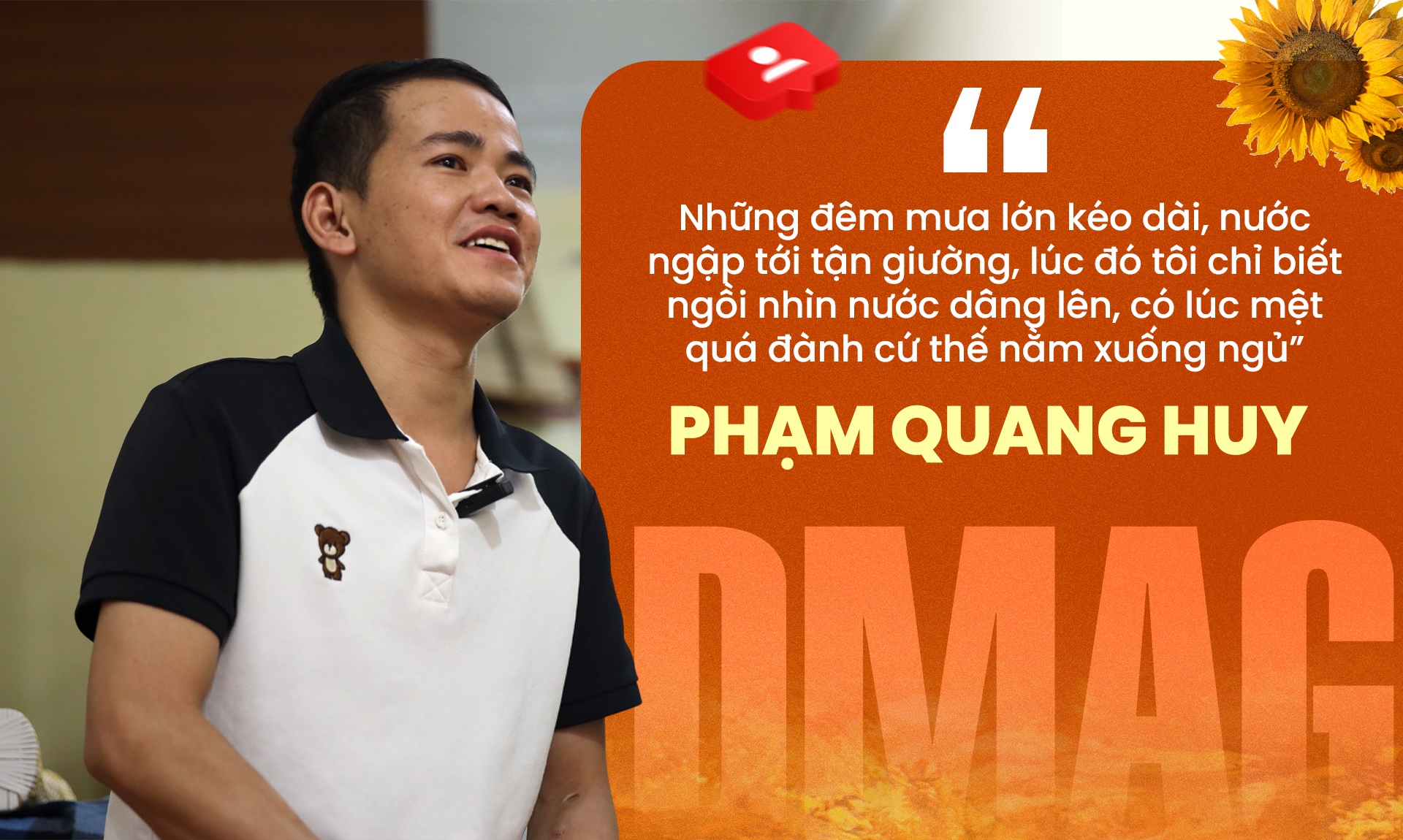
The only thing he always kept close by was his backpack from high school. All his medical bills, identification papers and a few old things: a notebook, a student card and pieces of paper with wishes from friends.
“On the afternoon of July 2015, my friends and I rode our bikes to school to take extra classes to get our vocational certificates. Suddenly, I felt exhausted. At the time, I thought it was just heatstroke or lack of sleep,” he said.
The subjectivity of youth made Huy ignore the warning signs of his body. Until the fatigue and pain lasted for a long time, the 18-year-old boy decided to take the bus to Hanoi to see a doctor.
Sitting in the hospital hallway, Huy remained optimistic, thinking he was just slightly ill or just lazy, but when he held the diagnosis paper with the words "Kidney failure stage 3B", he felt like his whole world had collapsed.
“My dream of learning a trade, working… a bright future suddenly disappeared in that moment,” Huy choked.
A few months later, Huy was forced to drop out of school because his body was weak.
“My friends at that time were able to go to school and decide their own lives. But I couldn’t decide anything, the hospital decided for me,” Huy confided.
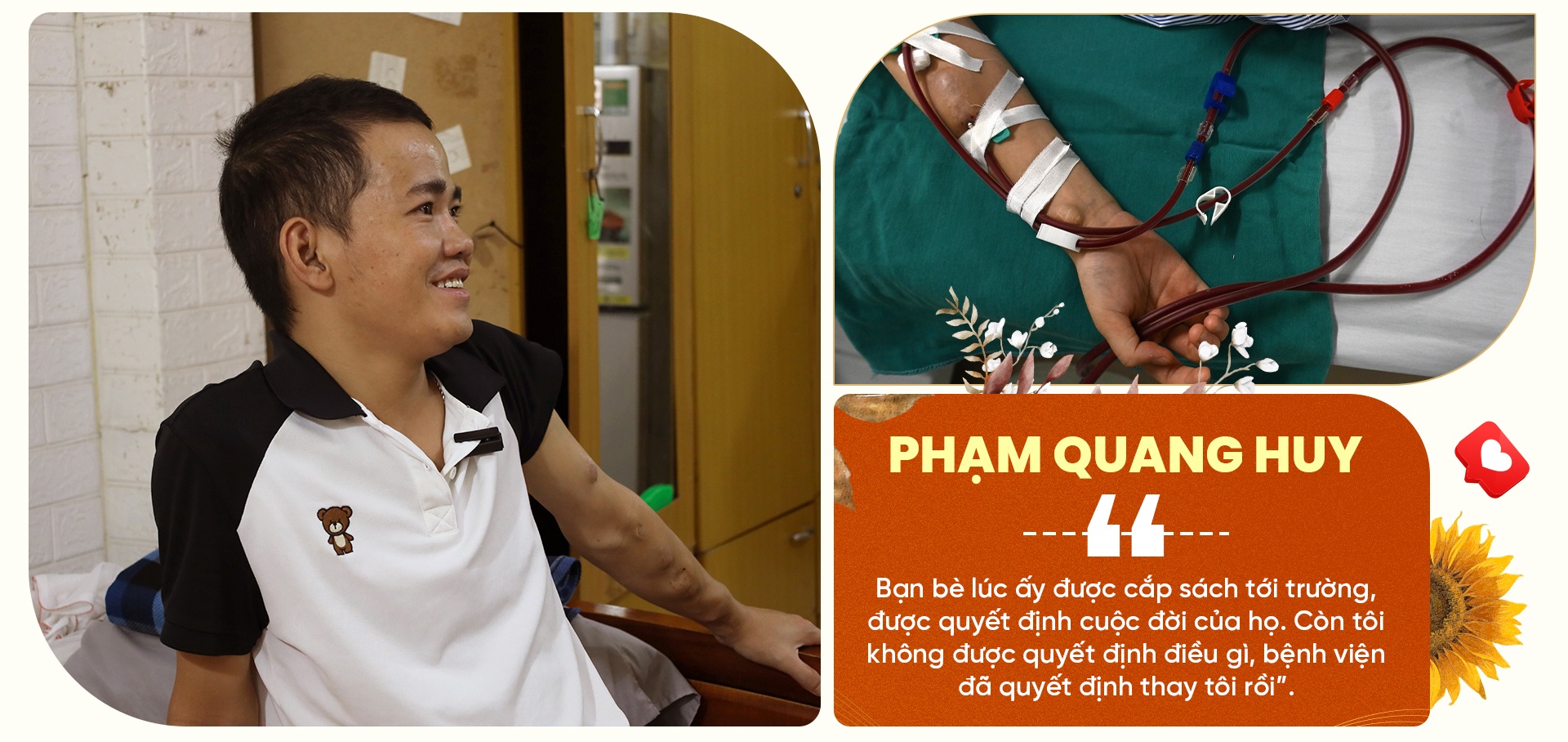
From then on, Huy traveled back and forth from Ung Hoa to Bach Mai Hospital by bus. Going to the hospital in the morning, returning home in the afternoon, more than three hours of repetition.
During the years of treatment, his father was always quietly by his side, a man of few words, used to carrying bags, taking queue numbers and waiting for hours outside the clinic door, just so his son could receive treatment in peace.
“I love my father more than I fear his illness. Seeing him getting thinner day by day, I feel so useless. The mental burden makes the physical pain worse,” Huy confided.

In 2020, Huy decided to rent a room in Hanoi for long-term treatment.
After each dialysis session, Huy quietly returned to his cramped rented room. He lay flat on the thin mattress, staring at the damp ceiling, bored with life.
“I couldn’t eat well, couldn’t sleep deeply, my body was exhausted, my mind was always empty, every day was the same. There were afternoons when I just sat motionless on the bed, not wanting to do anything,” Huy recalled.

I thought my mind would be stuck in the dialysis loop forever, but one evening, Huy watched a report about a disabled woman who sells lottery tickets, raises two young children, and takes care of her elderly mother with a serious illness.
In the clip, the woman said: "Although life is difficult, every time I come home and see my two children laughing and playing, I feel like I have more strength to live."
That moment made Huy speechless!
Thinking of his parents still working hard to earn every penny in the countryside, he suddenly remembered himself in high school, full of ambition and dreams of taking care of his family.
“I realized that I am still lucky, I still have parents and a home to return to. Just lying there waiting for everything to pass would be a waste,” Huy shared.
Instead of thinking about his illness, he started to sell things online through his personal Facebook page, both to keep his mind busy and to earn some extra income to cover hospital fees.
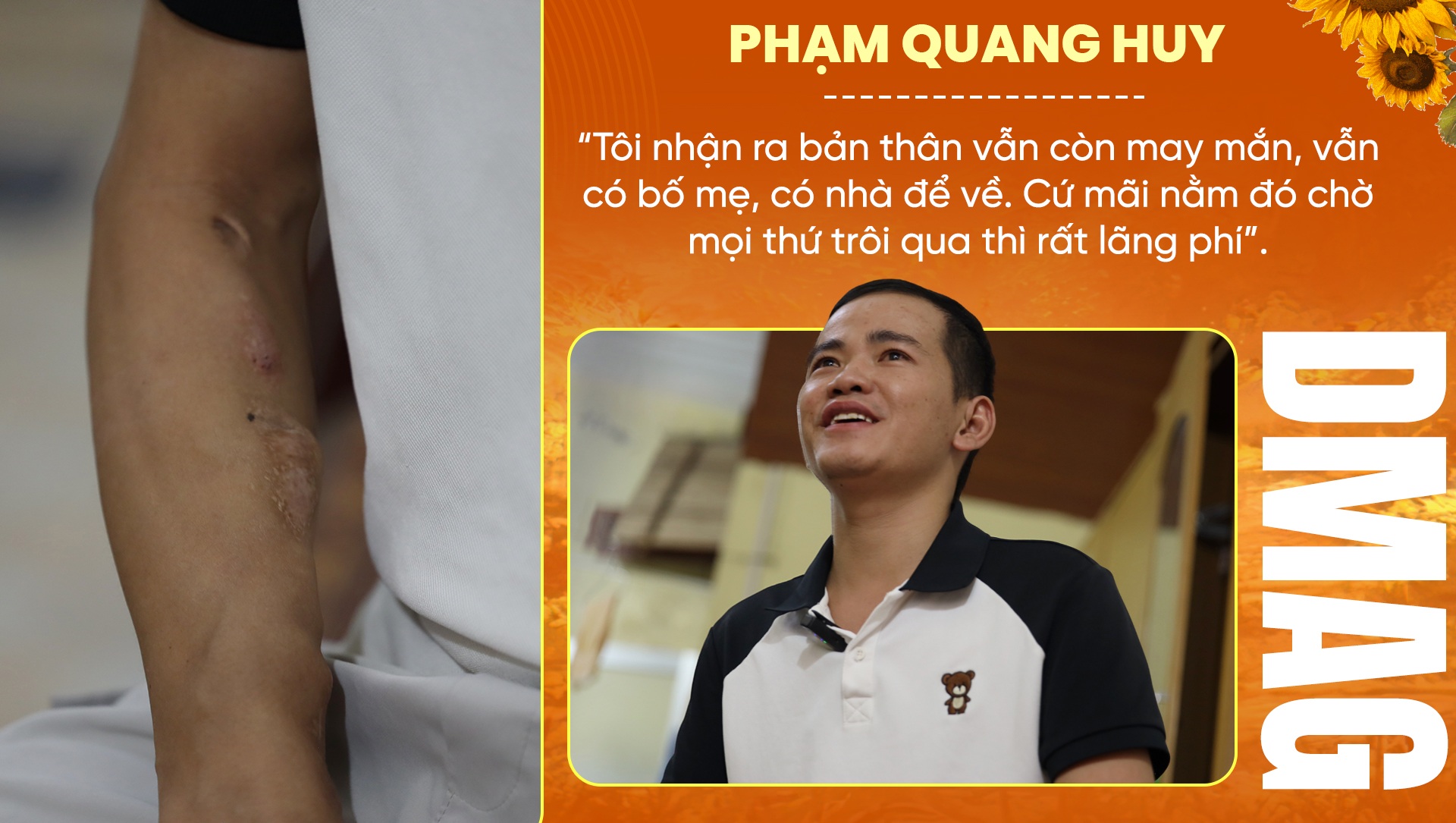
He started a small business making dried chicken himself. With just an old phone, Huy took photos of the products and posted them online.
In the early days, Huy mainly received orders from supportive relatives. Although not many, it was a great source of encouragement, he knew he had found a job suitable for his health condition.
From the first few orders, the young man learned how to take photos and write engaging content. As his business gradually stabilized, Huy boldly expanded his product lines to include: braised fish, banh khuc, and other essential items.
One day, Huy stayed up until 2am to pack goods, then took a few hours of sleep to get to the hospital on time for dialysis.
“When I earn money to take care of myself, I see that I still have value. My body is sick, but my mind is not,” Huy confided.
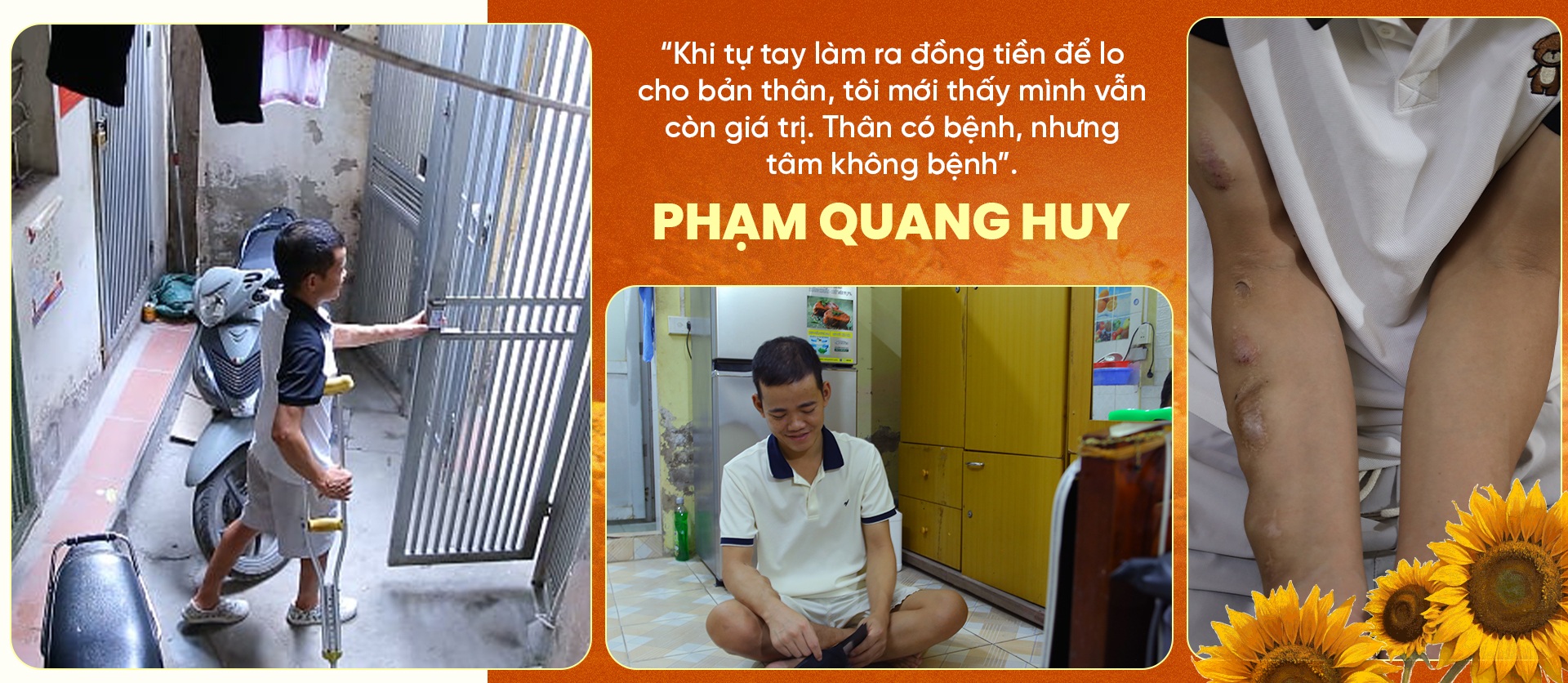
Thanks to his stable income, Huy moved to a new 17 square meter apartment with its own bathroom and kitchen.
“When I moved here, I didn't think I was changing my room, but changing my life,” Huy said, his eyes looking out the window.

10 years since the day he received the kidney failure diagnosis, he learned how to get out of the deadlocked days and rebuild his life from small things.
Every afternoon, when he feels well enough, Huy uses crutches to walk along the small alley where hundreds of patients rent rooms. In his hand, he holds a phone, so he can film and chat with the patients living nearby.
The TikTok channel "Bach Mai Dialysis Village" was created by him not long ago, recording the very ordinary moments of patients like himself.
Each video is a small slice of the simple life of the alley.
Although he has no experience in filming, taking photos or editing TikTok, Huy still tries to be meticulous in every step.
Before filming, he always wrote down every sentence he wanted to say, and if he stumbled over a word, he would re-record it from the beginning. The video was less than a minute and a half long but took more than two hours to edit.
“I don’t have modern equipment or professional training. But I think as long as I’m sincere, the audience will feel it,” Huy confided.
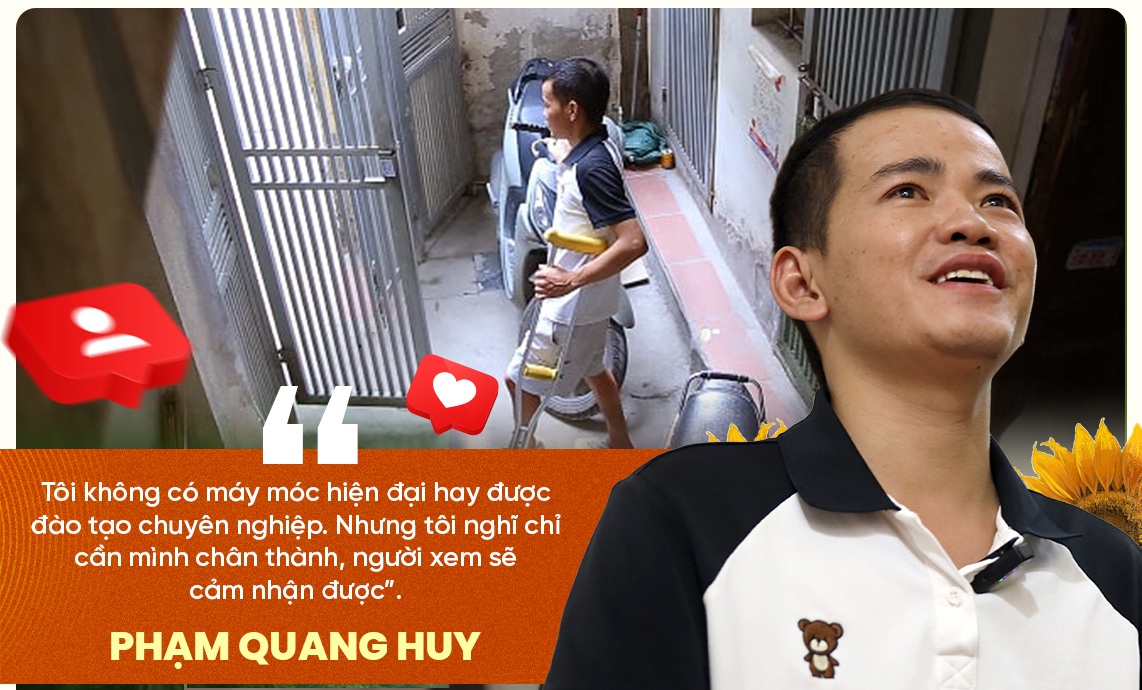
Huy added that what he is most passionate about is telling stories about people in similar situations to his in the dialysis neighborhood.
Each of the young man's videos receives a lot of comments, most of which come from people who are also struggling with kidney failure.
In a clip sharing about the swollen lymph nodes on the hands of dialysis patients, an account wrote: “It looks so scary. I also have stage 4 kidney failure.”
Encourage viewers: “It's normal, just stay relaxed. I wish you good health.”
In the same post, another person left a message: "Every time I see this, I cry because I'm in the same situation."
Huy responded with a real-life story he witnessed: “You always have to have a strong will. The person in my area has been on dialysis for the longest time, 30 years, and is still optimistic and happy.”
And so, in the middle of the narrow alleys, in the quiet life of the boarding house at 121 Le Thanh Nghi, a place that seems to be filled with nothing but illness and fatigue, there is still a young man walking every day with crutches and an old phone.
From a damp 4 square meter room, from flooded nights and packages of dried chicken to start a business, Huy rewrote his life with an indomitable spirit.
On his TikTok channel, Huy does not want to be the main character. He considers himself to be just the person behind the lens, listening and sharing, so that the daily stories in the “dialysis neighborhood” are not forgotten in the hustle and bustle of life.
Source: https://dantri.com.vn/suc-khoe/9x-suy-than-chong-nang-lam-tiktok-8-nam-cai-so-tu-phong-tro-4m2-20250729090617557.htm


![[Photo] General Secretary To Lam attends the 8th Congress of the Central Public Security Party Committee](https://vphoto.vietnam.vn/thumb/1200x675/vietnam/resource/IMAGE/2025/10/4/79fadf490f674dc483794f2d955f6045)

![[Photo] Solemn opening of the 8th Congress of the Central Public Security Party Committee, term 2025-2030](https://vphoto.vietnam.vn/thumb/1200x675/vietnam/resource/IMAGE/2025/10/4/f3b00fb779f44979809441a4dac5c7df)

![[Photo] Bustling Mid-Autumn Festival at the Museum of Ethnology](https://vphoto.vietnam.vn/thumb/1200x675/vietnam/resource/IMAGE/2025/10/4/da8d5927734d4ca58e3eced14bc435a3)





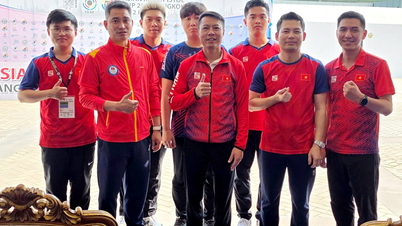








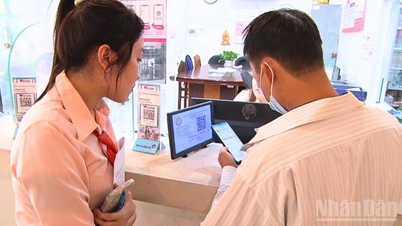








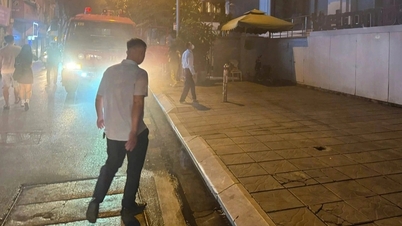




























![[VIDEO] Summary of Petrovietnam's 50th Anniversary Ceremony](https://vphoto.vietnam.vn/thumb/402x226/vietnam/resource/IMAGE/2025/10/4/abe133bdb8114793a16d4fe3e5bd0f12)

![[VIDEO] GENERAL SECRETARY TO LAM AWARDS PETROVIETNAM 8 GOLDEN WORDS: "PIONEER - EXCELLENT - SUSTAINABLE - GLOBAL"](https://vphoto.vietnam.vn/thumb/402x226/vietnam/resource/IMAGE/2025/7/23/c2fdb48863e846cfa9fb8e6ea9cf44e7)

































Comment (0)